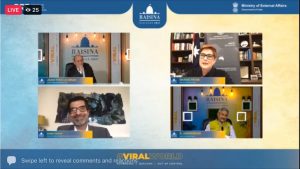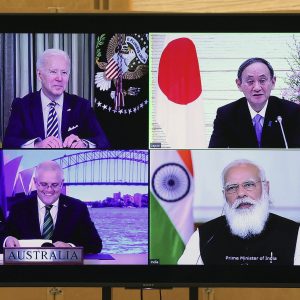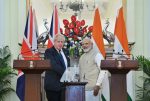
In a big-picture articulation of India’s sense of its extended neighbourhood, External Affairs Minister S. Jaishankar underlined that India will not be constrained by the Indo-Pacific and rejected the stereotyping of the Quad as an “Asian NATO (North Atlantic Treaty Organisation).”
The Indo-Pacific is a clear message that India will not be constrained between the Malacca Straits and the Gulf of Aden,” Mr Jaishankar said at the sixth Raisina Dialogue, which is being held virtually for the first time since its inception. “Our interests, influence, activity today go way beyond. When we look at a large canvas, we see Australia there, we see France…There are a range of activities and projects on which we can act together,” the minister said.
Repudiating the categorisation of NATO as Asian NATO, Mr Jaishankar said that discussions among the Quad’s four nations focus on issues like vaccines, student mobility, semiconductors, emerging technologies, climate change and maritime security. Mr Jaishankar stressed that the Indo-Pacific construct reflects a more contemporary image of the world, mirroring the overcoming of the Cold War and not reinforcing it.
Mr Jaishankar critiqued those using terms like “Asian NATO” (a veiled allusion to China) are playing “mind games” and stressed that India will not have others “veto” on what is it going to discuss, and with whom.
Mr Jaishankar was speaking at a panel which featured Australian Foreign Minister Marise Payne and visiting French Foreign Minister Jean-Yves le Drian also offering remarks on a new trilateral among France, Australia and India. The three shared the “same willingness to work together” and respected the rule of law, he said.

A month after the first Quad summit which brought together US president Joe Biden, Indian prime minister Narendra Modi, Australian prime minister Scott Morrison and Japanese prime minister Yoshihide Suga on a digital platform, Mr Jaishankar underscored that the purpose of the summit was to work together for their national, regional and global benefits. He said that he and his counterparts from the Quad including Payne had discussed cooperation on 10 subjects including new technologies and semiconductors.
Ms Payne, on her part, said developing nations across the Indo-Pacific were facing challenges due to the pandemic. She called for greater Quad cooperation like challenges to rules-based global, sustainability of oceans, climate change and strategic competition being witnessed in several parts of the globe. Mr Le Drian said that the three countries (France, India and Australia) were “certainly not into any sort of a military institution or format.”
“This is a very significant articulation of India’s foreign policy priorities in the post-Covid world. Dr Jaishankar is raising the bar for the Indo-Pacific and redefining notion of India’s extended neighbourhood by including the Indo-Pacific in it,” said Manish Chand, Founder-CEO, India Writes Network and President, Centre for Global India Insights (CGII), a newly-set up think tank focused on international affairs.

“Shedding ambivalence, Dr Jaishankar is also projecting India as a key shaper of a free, inclusive and prosperous Indo-Pacific,” said Mr Chand.
Author Profile
Latest entries
 India and the WorldDecember 31, 2022India’s SCO, G20 presidencies to strengthen world stability and security: Putin
India and the WorldDecember 31, 2022India’s SCO, G20 presidencies to strengthen world stability and security: Putin India and the WorldAugust 27, 2022SDG, green growth will top India’s G20 presidency agenda
India and the WorldAugust 27, 2022SDG, green growth will top India’s G20 presidency agenda India and the WorldMay 13, 2022Global Covid Summit: Modi calls for WHO, WTO reforms
India and the WorldMay 13, 2022Global Covid Summit: Modi calls for WHO, WTO reforms India and the WorldApril 22, 2022Johnson promises India-UK FTA by Diwali
India and the WorldApril 22, 2022Johnson promises India-UK FTA by Diwali







